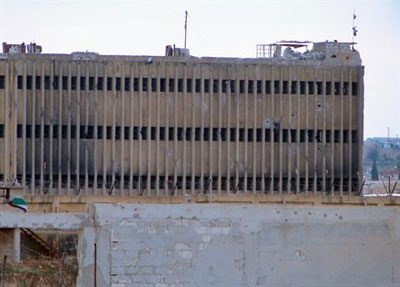
|
| A picture taken on Feb. 6, shows the Aleppo central prison during clashes. |
NEW YORK — On Thursday, May 22, Russia and China vetoed a resolution to refer the situation in Syria to the International Criminal Court for possible prosecution of war crimes and crimes against humanity committed during the country’s three-year civil war.
This was the fourth time Russia — a close ally of Syrian President Bashar al-Assad’s government — and China have blocked U.N. Security Council action on Syria during the three-year civil war that has killed more than 150,000 people.
The U.S. Ambassador to the United Nations, Samantha Power, said the victims of the conflict “deserve to have history record those who stood with them and those who were willing to raise their hands to deny them a chance at justice.”
“Our grandchildren will ask us years from now how we could have failed to bring justice to people living in hell on earth,” Power told the council after the vote.
There were more than 60 co-sponsors of the French-drafted resolution, diplomats said. The resolution was put to a vote with the knowledge that it would be vetoed. The remaining 13 members of the council voted in favor of the resolution.
“If members of the council continue to be unable to agree on a measure that could provide some accountability for the ongoing crimes, the credibility of this body and of the entire organization will continue to suffer,” U.N. Deputy-Secretary-General Jan Eliasson told the council on behalf of Secretary-General Ban Ki-moon.
The ICC prosecutor cannot investigate the situation in Syria without a referral from the 15-member Security Council because Damascus is not a member of the Rome Statute that established The Hague-based court a decade ago. The Security Council has previously referred Libya and Darfur, Sudan to the ICC.
Russian U.N. Ambassador Vitaly Churkin questioned why the resolution was put to a vote when it would again expose disunity in the council, which had previously been able to agree resolutions on the destruction of Syria’s chemical weapons and demand greater humanitarian aid access in the country.
“The draft resolution rejected today reveals an attempt to use the ICC to further inflame political passions and lay the groundwork in the end for eventual outside military intervention,” Churkin told the council.
“We’re convinced that justice in Syria will eventually prevail. Those guilty of perpetrating grave crimes will be punished but in order for this to happen peace is first needed,” Churkin said.
French U.N. Ambassador Gerard Araud dismissed Churkin’s explanation. “It’s a very say day,” he said. “Russia has not explained really well why it was opposing this referral.”
Chinese Deputy Ambassador Wang Min defended China’s veto, saying Beijing long had reservations about the council referring conflicts to the International Criminal Court.
Lithuanian Ambassador Raimonda Murmokaite called the double veto “an endorsement of impunity.” Australian Ambassador Gary Quinlan warned of the cost of the deadlock: “When we fail, as we have again on Syria today, the consequences can be devastating.”
Syria’s U.N. Ambassador Bashar Ja’afari told the council the resolution was a bid to undermine a June 3 presidential poll.
U.N. investigators said in March that they had expanded their list of suspected war criminals from both sides in the civil war and that the evidence was solid enough to prepare any court indictment.
Syrian troops break Aleppo prison siege
On Thursday, Syrian troops ended the siege of the main prison in the northern city of Aleppo, ending a months-long attempt by rebels to free the inmates inside, opposition activists and state media have said.
The sprawling Aleppo Central Prison, which holds an estimated 4,000 inmates, has witnessed deadly clashes between government and opposition forces for the past year.
Rebels had repeatedly barrelled suicide car bombs into the front gates and fought guards and troops holed up inside.
Government troops bombarded rebel positions around the prison after taking over a strategic hill nearby on Wednesday morning, Syrian state television reported.
“This is a major blow for rebels,” Al Jazeera’s Rula Amin, reporting from Beirut in neighboring Lebanon, said. “They besieged the prison for 13 months, trying to free prisoners.
“But the siege has caused a humanitarian crisis in the prison. Regime troops had to airlift some supplies to the guards and the prisoners.”
The Syrian Observatory for Human Rights, an activist monitoring group, said there were fears that government forces might kill some of the inmates and “claim that they died during the rebels’ siege of the prison.”
Aleppo has been carved into rebel- and government-controlled areas since opposition fighters launched an offensive in the north in mid-2012.
Army advancing
The Syrian army appears intent on taking opposition-held parts of the country’s major cities before the country’s June presidential election.
The prison lies on a highway about six kilometres north of the city of Aleppo, once Syria’s commercial capital.
The civil war devastated the city, leaving rebels controlling the east and the government forces holding the west.
“The air raids were astonishing,” said Ibrahim Saeed, an activist based in Aleppo province. “The air force tipped the balance of power. More than 100 barrels bombs struck the area around the prison.”
Saeed said the next target of government forces appears to be the nearby town of Handarat, then the Kindi Hospital, in an attempt to close rebel supply lines from the countryside into Aleppo.
He added that after the capture of the prison, Assad’s forces are now close to a command center of the Islamic Front alliance, a coalition of seven rebel groups fighting the government.
The centre is in an army infantry base that was captured by rebels two years ago.
— Reuters, Al Jazeera, TAAN






Leave a Reply